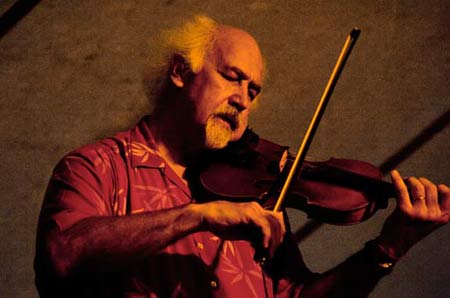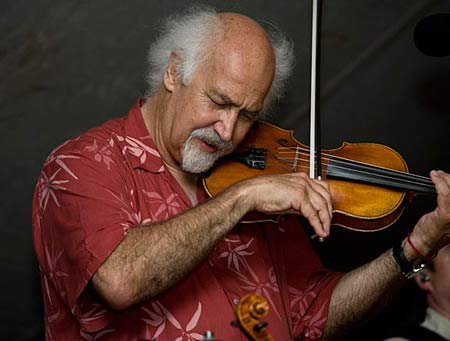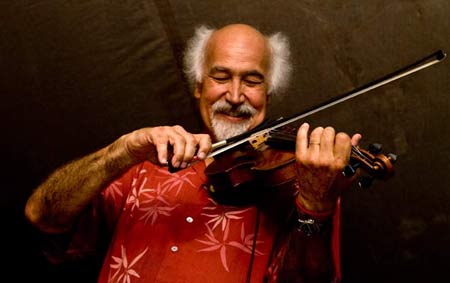|
Archive Files of Cajun, Creole, and Zydeco Musicians |
Michael Doucet:
|
|
High res photos of BeauSoleil avec Michael Doucet posted
on Flickr. Smithsonian Folkways releases 2008 Michael Doucet CD From Now On |
|

Photos above were taken during a
BeauSoleil performance
Click here to
return to the first page on Michael Doucet |
From Now On, Michael Doucet’s first recording on the Smithsonian Folkways label, is the product of studio sessions, but everything is laid-back and casual, the way musicians groove alone or together at home just for their own pleasure, playing whatever moves them. That’s the kind of spontaneous enjoyment this CD offers. Those familiar with the many directions in which Michael Doucet has taken Cajun music with his band BeauSoleil will not be surprised by the range of selections on the CD, but they will be pleased by the way he explores the possibilities, either on his own or together with two other top musicians, one Cajun and the other from New Orleans. Six of the songs feature Doucet playing solo on either fiddle or octave fiddle. He is joined by fiddler Mitchell Reed on five numbers and by New Orleans jazz and funk guitarist Todd Duke on six others. On “Le Two-Step de Basile” Doucet delivers yet another exquisite solo virtuoso performance. For “Bee de la Manche,” he strokes the octave fiddle to bring out the raw, earthy feeling of Canray Fontenot’s song that he originally recorded with Canray in 1981. The octave fiddle contributes a rich, sonorous beauty to “Contradance de Mamou. “Reels de Mamou,” which combines several fiddle tunes, draws on another older dance style. “Wade’s Two-Step” is an accelerated version of a waltz by Eunice fiddler Wade Fruge with whom Doucet used to play. . |
|
“Madame Young” was originally recorded in 1929 by Dennis McGee, whose deep roots in the Cajun tradition had a profound influence on Doucet during their long friendship that ended in 1989 when McGee died at age 96. In his track notes, Doucet explains that the tune was slightly altered by Cajun fiddler Doc Guidry to become “Allons danser, Colinda.” One of the many rewards of the CD is the opportunity to hear twin fiddling with Mitchell Reed, who, before he joined BeauSoleil, had long established himself as one of the top Cajun fiddlers as a member of groups like the Mamou Prairie Band, Tasso, Charivari and others (he currently also plays fiddle with Racines). Though Doucet and Mitchell Reed do occasional twin fiddle numbers during BeauSoleil performances, Reed spends most of his time on bass. On the CD, Doucet and Reed channel Dennis McGee and Sady Courville for inspired collaborations on “Chez Denouse,” and “Happy One-Step” and on “L’amour ou la folie,” the title song of BeauSoleil’s 1998 Grammy-winning CD. They also play “Brasse le gombo vite” and Chère Evangeline (based on a Swedish folk song learned from an English fiddler). Doucet never picks up the accordion on stage, but, with the comfortable ease of a back porch musician, he gives us his version of “Amédé’s Accordion,” a tribute to the intricate style of the truly legendary Creole musician Amédé Ardoin. In the collaborations with Todd Duke, Doucet and Duke trade leads as they glide through the twists and turns of “Fonky Bayou,” arrive in the heart of Hoagy Carmichael’s “New Orleans,” and give us their rendition of one of the most popular jazz numbers of all time, “Saint Louis Blues.” “Madame Boudreaux” is actually a Cuban rumba that became a New Orleans Creole song before it was Cajunized by Nathan Abshire as “Mama Rosin.” Doucet’s lyrics celebrate a woman who loves to cook gumbo and go dancing. On the opening cut, Doucet’s octave fiddle matches Duke’s funky guitar to the tune of Allen Toussaint’s “Everything I Do Gonna Be Funky.” The CD ends with Doucet switching to guitar for “You Gotta Move,” a quiet, haunting blues sung in English with the lyrics repeated in French at the close. Accompanying the CD is a long, very informative biographical sketch by Andy Wallace. Doucet’s lively track notes tell us where the music came from and why he likes it. As far as I can tell, Doucet is the first Cajun musician to release a CD on the Smithsonian-Folkways label. In 1987, after the death of Moses Asch, the founder of Folkways, the Smithsonian acquired the label’s entire collection of more than 2,000 records, including a limited number of Cajun releases that continue to be available on-line and as custom-produced CDs. The label is legendary among fans of folk and world music. (Some forty years ago, while an undergraduate at LSU, I recall searching out the address of Folkways Records to order a copy of Woody Gutherie’s “Dust Bowl Days.”) It is thus especially noteworthy that Doucet has been chosen for a new recording under the auspices of the Smithsonian, which is carrying forward the mission of a record label that has played an essential role in preserving the world’s musical heritage. 2007 Arhoolie
release feature Michael and David Doucet on many cuts Click here for more pictures of Michael Doucet and BeauSoleil. Click here for more information from Doucet's booking agent.
|
|
All photographs and text by David Simpson.

